- Home
- Keith R. A. DeCandido
I.K.S. Gorkon Book One: A Good Day to Die
I.K.S. Gorkon Book One: A Good Day to Die Read online
WOL STARED INTO THE CREATURE’S EYES.
No, not a creature. For one thing, no mere animal could have crafted so impressive a weapon.
For another, the eyes that looked back at Wol were those of a warrior born who was prepared to do whatever it took to defeat Wol, just as Wol would not rest until her foe was dead.
I said I wanted a challenge, Wol thought, baring her teeth. “Today,” she said, “is a good day to die!”
The alien said something in its language.
Wol then attacked.
The bloodlust rose within her as she leapt at her foe, mek’leth swinging ahead of her. They had taken away her honor, her family—all that was left to her was this.
Her foe did not limit its attack to its weapon. Claws, teeth, legs, all were used in service of its goal: to kill her. She, in turn, was bigger and had better protection. A glancing blow to her arm was absorbed by her gauntlets, where a like blow from her drew blood from her opponent.
Wol had no idea how long the fight had gone on when her opponent finally disarmed her. As her mek’leth went flying across the road, Wol grabbed for her foe’s snout, then pulled the jaws apart, screaming her fury to the heavens as she did so. The alien tried to slice her torso open with its sword, and did succeed in drawing blood this time, but Wol was determined to score a victory. She yanked the alien’s head backward, and heard the glorious snap of bone.
This book is a work of fiction. Names, characters, places and incidents are products of the author's imagination or are used fictitiously. Any resemblance to actual events or locales or persons, living or dead, is entirely coincidental.
An Original Publication of POCKET BOOKS
POCKET BOOKS, a division of Simon & Schuster Inc.
1230 Avenue of the Americas, New York, NY 10020
Visit us on the World Wide Web:
http://www.SimonSays.com/st
http://www.startrek.com
Copyright © 1999 by Paramount Pictures. All Rights Reserved.
STAR TREK is a Registered Trademark of Paramount Pictures.
This book is published by Pocket Books, a division of Simon & Schuster Inc., under exclusive license from Paramount Pictures.
All rights reserved, including the right to reproduce this book or portions thereof in any form whatsoever. For information address Pocket Books, 1230 Avenue of the Americas, New York, NY 10020
ISBN: 0-7434-5715-3
POCKET and colophon are registered trademarks of Simon & Schuster Inc.
For Gene L. Coon, who gave us our first glimpse,
John Colicos, who gave us our first view,
and John M. Ford, who gave us our first insight
Honor is a code set not in stone nor on parchment, but in the blood and bone of warriors, in the souls that stir in their breasts, and the actions of their daily lives. It comes from the deepest part of us, coloring our every decision. It is an instinctive knowledge of right and wrong, that while not always in agreement with the laws of the land, is always in agreement with our hearts. Without a sense of true honor, we are nothing, for we have lost our sense of self, lost that which defines us as warriors, lost that which keeps our Empire strong. —Engraved on the entryway to the hall
of the House of Jakvi
HISTORIAN’S NOTE
This novel follows the two previous I.K.S. Gorkon adventures in the Star Trek: The Next Generation novel Diplomatic Implausibility and Book 2 of the Star Trek duology The Brave and the Bold. It commences approximately six months after Star Trek: Deep Space Nine’s final episode “What You Leave Behind,” and three years prior to the movie Star Trek Nemesis. That would put it toward the end of the Year of Kahless 1001 on the Klingon calendar, at approximately Stardate 53400 on the Starfleet calendar, and in mid-to-late 2376 on the human calendar.
A GOOD DAY TO DIE
CHAPTER ONE
The faces of the greatest warriors of the past ten centuries stared down at Klag, son of M’Raq.
Throughout the Hall of Warriors on Ty’Gokor, a huge, windowless, high-ceilinged room carved out of the very rock of the planet’s greatest mountain, statues of the strongest Habnagh rendered some of the finest heroes of the Klingon Empire. They loomed over the warriors assembled for the induction ceremonies for the Order of the Bat’leth.
Captain Klag stood by a barrel of bloodwine. He found the libation to be barely drinkable, but then Klag had always had a more discerning palate than most when it came to alcohol. In order to accommodate the hundreds of warriors present for the induction ceremony—who would be spending the entire night in celebration—the High Council had ordered the bloodwine in bulk. An Empire still recovering from the economic ravages of a prolonged war was not going to acquire an especially lofty vintage for the occasion.
Still, they could at least have provided something less watery, Klag thought as he he refilled his mug by scooping it into the barrel.
Next to him, Klag’s second officer and doctor did likewise. Lieutenant Toq and Dr. B’Oraq had come down with Klag from the I.K.S. Gorkon to cheer their captain as he was given one of the Empire’s highest honors.
Around him, warriors shouted, sang, wrestled, laughed, ate, and drank. The sounds of celebration echoed off the high ceilings of the Hall, reverberating off the walls and the statues themselves, so much so that Klag could not determine the origin of this shout of triumph or that cry of pain that reached his ears.
Klag looked up at a statue far across the room from where they stood.
Toq followed his gaze. “Who is that, Captain?”
Shaking his head, Klag thought, Youth. “That is Ch’gran.”
To Klag’s relief, Toq recognized the name. “The lost colony.”
“Yes.” Klag gulped down some bloodwine. “Captain Ch’gran led the first fleet that attempted to colonize another world after the Hur’q pillaged Qo’noS. For many turns, the finest engineers constructed spacecraft, using whatever meager resources the Hur’q had left us. Many called them fools. Many called them wasteful. But Captain Ch’gran knew that we would never regain our honor, never be able to avenge ourselves on the Hur’q, if we did not conquer space. Soon, seven mighty vessels had been built, and Ch’gran led them out into the vastness of the black sky—only to be lost forever.”
“Not quite forever,” B’Oraq said with a smile as Klag drank some more bloodwine. “Didn’t they at last find the colony remains on Raknal V?”
“Yes,” Klag said, “but that is a different story.” He raised his mug. “To Ch’gran!”
Not only Toq and B’Oraq but several others who had gathered nearby repeated the toast. “To Ch’gran!”
Then they all gulped their bloodwine. Several warriors head-butted Toq, who returned the gesture eagerly. One did likewise with Klag.
“You tell the story of Ch’gran well,” the warrior, who sported a commander’s insignia, said after pouring some bloodwine in the general direction of his face—some of it even making it into his mouth, but most of it running through his brown beard.
“You honor me, Commander—?”
“Grakal, son of Kerr. You are Klag, son of M’Raq, are you not?”
“Yes.”
“The hero of Marcan V!” Grakal turned to his companion, standing unsteadily behind him. “I told you it was him!”
“It cannot be,” the other Klingon said. “Klag lost his arm at Marcan V.”
“It is true, my right arm was taken from me at Marcan.” He scooped up some more bloodwine. Grakal and the others looked at him with faces ranging from expectant to confused to so inebriated as not to care—but they obviously expected another story.
Who am I to deny them? “I s
erved aboard the Pagh under Captain Kargan.”
One of the drunker warriors raised his mug. “To Captain Kargan!”
“To Captain Kargan!” many of the others repeated, and drank their bloodwine.
Klag pointedly did neither, but continued his story. “The Pagh was one of twelve that faced six Breen and Jem’Hadar vessels on that great day at Marcan. The battle was glorious—many warriors died that day in battle, but they took the despicable Breen and the honorless Jem’Hadar with them.”
Several members of Klag’s audience—which had already doubled in size—cheered at that. Warriors were always up for a good story, drunken warriors even more so, and this was a story Klag had yet to tire of telling.
“When the battle had ended, only two ships remained: the Pagh and one of the Jem’Hadar ships. But we were both severely damaged. The fifth planet had breathable air, so Kargan ordered us to land. The Jem’Hadar did the same.”
“So the fight was to continue on the ground?” B’Oraq asked with a smile.
Klag shot her a look. She, of course, knew this story, but she spoke as one who enjoyed hearing it again. “Yes. Our stabilizers had been damaged, so when we entered the atmosphere, we were thrown across the ship like riders on a bucking mount. By the time I regained my senses, I was on the deck, my right side pinned by the tattered remains of the command chair. I couldn’t feel my right arm, but I could see it sticking out from the other side of the debris. With a mighty shove, I rolled the twisted piece of metal off me with my left hand—and then I stood to get a damage report.” Klag took a long gulp of bloodwine. “My right arm remained on the deck.”
“That is no way to lose an arm,” Grakal said.
“No, it was not. I was furious—an anger that increased a thousandfold when I saw that I was the only one who lived through the crash. Our fine crew did not deserve to die such a death after having survived the Jem’Hadar!”
The warriors grunted and shouted in acknowledgment of this injustice.
Klag left out the great glee that he experienced upon seeing the corpse of Captain Kargan. A member of the influential House of K’Tal, and as great a fool as ever lived, Kargan had kept Klag under his heel for a decade. Too inept to inspire warriors to go into battle, but too well connected to be removed from duty by any honorable means, Kargan kept Klag as his first officer in order to cover his own inadequacies, blocking all opportunities for Klag to be promoted, and using Klag’s greater skills to further his own lacking honor.
However, Klag saw no reason to pollute the story with Kargan. This was his moment of glory. “It was therefore left to me to finish what we had begun. After all, if I survived, some of the enemy might have as well—and that meant the battle was not yet over.”
“The battle is never over as long as one of the enemy yet lives.” The words were originally spoken by Kahless, now quoted by a woman who stood next to Grakal.
“Yes.” Klag smiled at the woman. He drank down the rest of his bloodwine, then refilled his mug. “In fact, ten Jem’Hadar and one Vorta still lived amidst the wreckage of their ship. Armed with a mek’leth, I went to greet them.”
“Only one warrior, with only one arm, against ten Jem’Hadar?” one warrior said, skeptically.
“Do you doubt me?” Klag asked. In fact, it had been only seven Jem’Hadar, but ten was a rounder figure….
Before the warrior could answer, one of his comrades slammed him in the stomach. “Let him speak, fool!”
Pointedly looking at each member of his audience save the skeptic—now doubled over in pain—Klag said, “The Jem’Hadar may have been bred for combat, but the heart of a warrior cannot be grown in a Vorta laboratory. Within minutes, I stood amongst the corpses of my enemies, my mek’leth stained with their blood and the Jem’Hadar’s white drug. I was triumphant! Our victory paved the way for our forces to penetrate the Allicar Sector.”
Grakal nodded. “Allicar was a great victory.”
Toq, who had listened eagerly to Klag’s story even though he probably knew it by heart, said, “To Klag! Single-handed defeater of the Jem’Hadar!”
By this time, over a dozen were gathered around to hear Klag’s tale. They all cried, “To Klag!,” gulped their bloodwine, and head-butted each other, laughing.
The woman who quoted Kahless spoke then. “How is it that you come to have two good arms once more, Captain? Have you one of those mechanical contrivances the Federation uses? Are you Borg now?”
Tossing his mug to the floor in disgust, Klag said, “I would never put a machine on my body and call it my limb!” He held up his new arm. “This once served as the good right arm of my father, M’Raq, son of K’Ton. He was one of the finest warriors in the Empire. My physician, Dr. B’Oraq,” he said, indicating B’Oraq with his hand, “performed the procedure. Father and son have been reunited as one to forge a new path of honor!”
Several cheered at that. Klag took the moment of the cheer to grab a fresh mug from the pile next to the barrel.
“You should wear your scars proudly,” one warrior said over the cheers, “not hide them behind false limbs.”
Grakal asked, “Were you not listening? Do you truly think that he hides his glory? And why should he not give himself a new arm? One who survives battle should live to fight another day, not be handicapped by ancient customs.”
“Do you find honor and duty an ancient custom as well?” the other warrior asked. He pointed at the statue of Kull, a contemporary of Kahless; the statue represented a warrior who was bereft of his left hand. “When Kull lost his hand in battle against Kinaan the Foul, did he have a sorcerer graft another’s hand onto him?”
“No,” Grakal said, “and Kull didn’t use a disruptor to kill Kinaan, either. Mainly because they didn’t exist.”
B’Oraq looked sharply at the skeptical warrior. “Should we abandon transporters because Kahless did not have one? Should ships that go at warp speed be scrapped because Kahless could not travel faster than light?”
“Bah!” The warrior walked up to the barrel and scooped up some bloodwine, then stomped off in search, no doubt, of a story more to his liking.
Meanwhile, the woman turned to Klag. She wore a captain’s insignia. “It is an honor to meet you, Klag. I am B’Edra—I command the Taj.”
Klag held up his mug. “You won the day at Orias.”
“The Taj was one of many vessels that won that day.” B’Edra did, however, return the toast. Both she and Klag drank heartily, as did B’Oraq, still standing next to Klag.
“Are you to be honored come the morning, Captain?” Klag asked.
“No. I am here at the insistence of my first officer. He was inducted several years ago, and he always returns for the new inductions if his duty permits. We were on undesignated maneuvers in a nearby system, and so I acceded to his request to participate.” She smiled. “In truth, your presence is part of why I agreed, Captain.”
This surprised Klag. “Why is that?”
“Your victory at Narendra III. Another warrior might have simply fought against the vessels that were enthralled by Malkus. But you gave them a chance to retain their honor and not die with their eyes blinded. I respect that.”
Klag nodded his appreciation. A ninety-thousand-year-old tyrant named Malkus had had his consciousness implanted in an artifact that had been buried on Narendra III. Its accidental unearthing enabled Malkus to telepathically control all who dwelt on the planet as well as the seven ships in orbit. With the aid of a Federation starship, the Gorkon was able to stop Malkus. Klag had made sure that they fought only defensively: enough to keep the upper hand, but without dishonoring the warriors who were, after all, only victims, by forcing them to die when not even in their right minds.
B’Edra then turned to the physician. “You are also to be commended, Doctor. Klag’s courage is already well documented, but yours is no less so.”
B’Oraq tugged on the auburn braid that hung down over her right shoulder, secured by a pin with the emblem of her Hou
se. “You flatter me, Captain. I merely do what I can in service of the Empire.”
“Not at all. Fools like that petaQ, ” she indicated the warrior who had stomped off, now engaged in—and losing—a wrestling match, “are legion. You challenge the fundamentals of what makes us Klingon—what makes us warriors.” She looked around and raised her mug. Grakal and Toq were laughing over some shared joke, but they noticed her gesture and did likewise, as did a few others. “To B’Oraq! May she guide the way to a glorious future, where our warriors can continue to fight in this life in order to improve their honor and increase their glory in the next!”
Smiling, B’Oraq raised her mug in appreciation while the others cried, “To B’Oraq!”
“Oh yes, let us praise the butcher!” yelled a familiar voice from behind Klag.
What in the name of Kahless is he doing here? Klag thought, not even bothering to turn around. “Why are you here, Dorrek?”
Captain Dorrek of the I.K.S. K’mpec, the Gorkon’s sister ship, stepped up to the barrel. “Let us praise the one who allowed her captain to soil the memory of a great warrior by stitching his remains onto the shoulder of an unworthy fool.” He scooped his mug into the bloodwine barrel, then threw the mug against the wall. It clattered to the floor, bloodwine flying in all directions. “You dare much to bring this creature into a hall of warriors. I should think they shall have to fumigate the statues to remove the stench of her chamber of horrors from this noble place!”
B’Oraq tensed, her hand going to the d’k tahg on her belt.
Klag looked down upon Dorrek, who stood a full head shorter than Klag. “She has as much right to be here as you do. After all, she is a member of my crew.”
“Yes. How fitting that a vulture who consumes the carrion of the dead serves with one such as you. You’d both be more suited to a Kreel ship.”
Now Toq stepped forward, unsheathing his d’k tahg. “I will not hear such words spoken of my captain!”

 Alien
Alien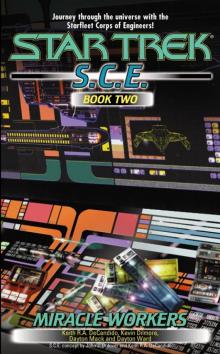 Miracle Workers
Miracle Workers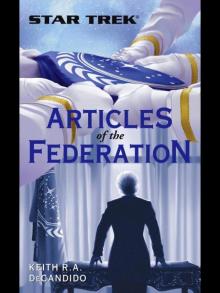 Articles of the Federation
Articles of the Federation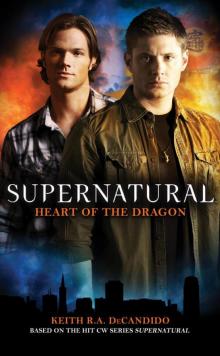 Supernatural Heart of the Dragon
Supernatural Heart of the Dragon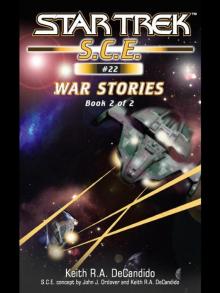 War Stories: Book Two
War Stories: Book Two The Zoo Job
The Zoo Job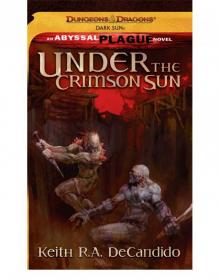 Under the Crimson Sun
Under the Crimson Sun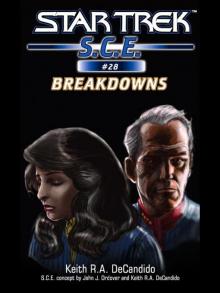 Breakdowns
Breakdowns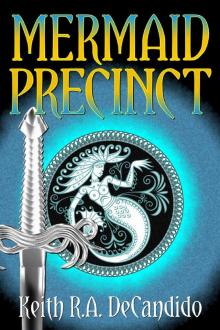 Mermaid Precinct (ARC)
Mermaid Precinct (ARC)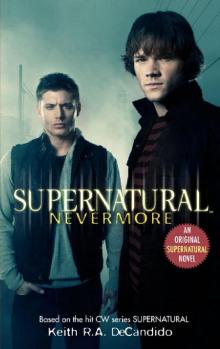 Supernatural 1 - Nevermore
Supernatural 1 - Nevermore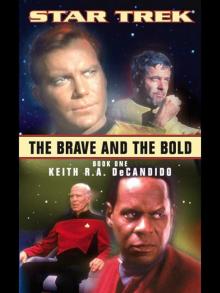 STAR TREK - The Brave and the Bold Book One
STAR TREK - The Brave and the Bold Book One Four Walls
Four Walls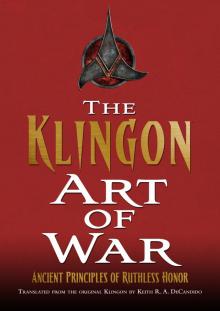 The Klingon Art of War
The Klingon Art of War Blackout
Blackout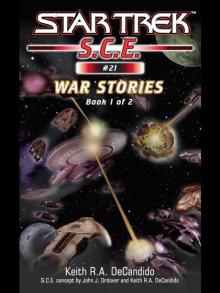 War Stories: Book One
War Stories: Book One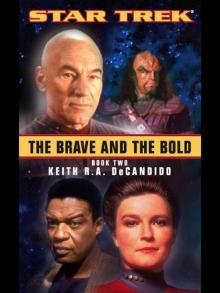 The Brave and the Bold Book Two
The Brave and the Bold Book Two Honor Bound
Honor Bound Sleepy Hollow: Children of the Revolution
Sleepy Hollow: Children of the Revolution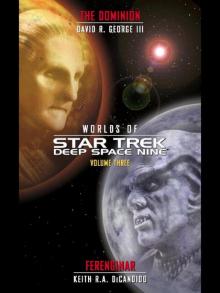 Worlds of Star Trek Deep Space Nine® Volume Three
Worlds of Star Trek Deep Space Nine® Volume Three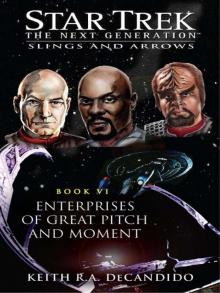 Star Trek: TNG: Enterprises of Great Pitch and Moment
Star Trek: TNG: Enterprises of Great Pitch and Moment Genesis
Genesis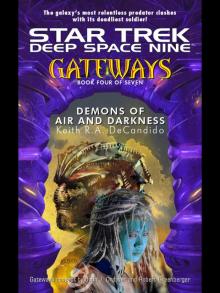 Demons of Air and Darkness
Demons of Air and Darkness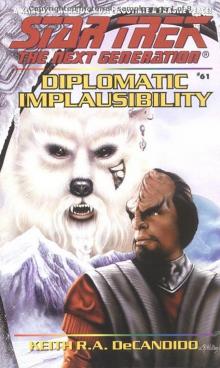 Star Trek - TNG - 61 - Diplomatic Implausibility
Star Trek - TNG - 61 - Diplomatic Implausibility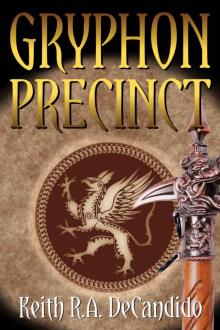 Gryphon Precinct (Dragon Precinct)
Gryphon Precinct (Dragon Precinct)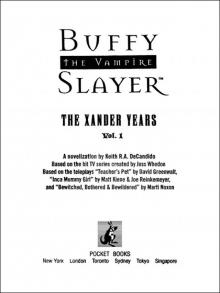 THE XANDER YEARS, Vol. 1
THE XANDER YEARS, Vol. 1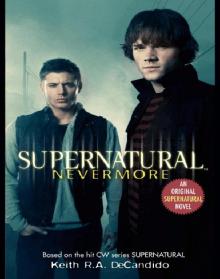 Nevermore
Nevermore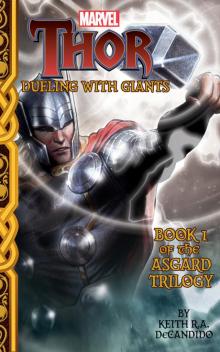 Thor
Thor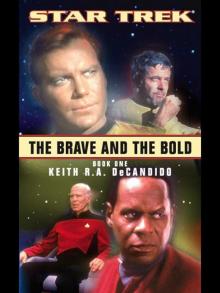 The Brave And The Bold Book One
The Brave And The Bold Book One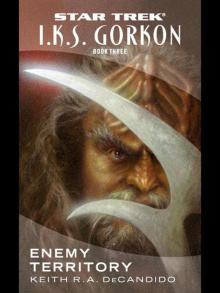 I.K.S. Gorkon Book Three
I.K.S. Gorkon Book Three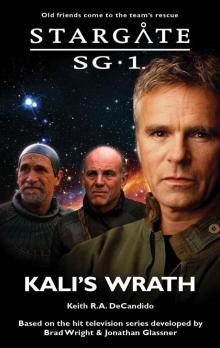 STARGATE SG-1: Kali's Wrath (SG1-28)
STARGATE SG-1: Kali's Wrath (SG1-28)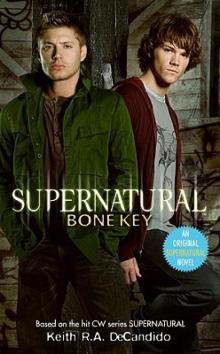 Bone Key
Bone Key Guilt in Innocece
Guilt in Innocece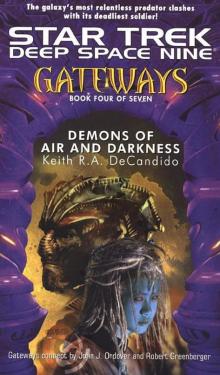 Star Trek - DS9 Relaunch 04 - Gateways - 4 of 7 - Demons Of Air And Darkness
Star Trek - DS9 Relaunch 04 - Gateways - 4 of 7 - Demons Of Air And Darkness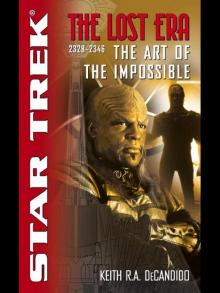 The Art of the Impossible
The Art of the Impossible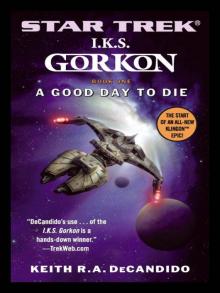 I.K.S. Gorkon Book One: A Good Day to Die
I.K.S. Gorkon Book One: A Good Day to Die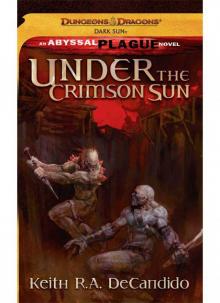 Under the Crimson Sun (the abyssal plague)
Under the Crimson Sun (the abyssal plague)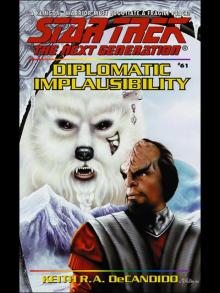 DIPLOMATIC IMPLAUSIBILITY
DIPLOMATIC IMPLAUSIBILITY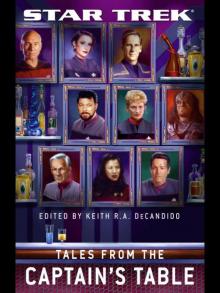 Tales from the Captain's Table
Tales from the Captain's Table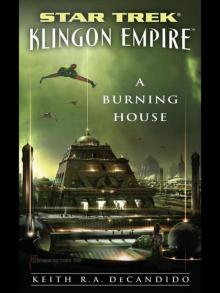 A Burning House
A Burning House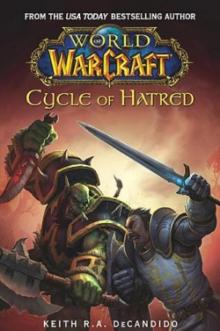 Cycle of Hatred (world of warcraft)
Cycle of Hatred (world of warcraft)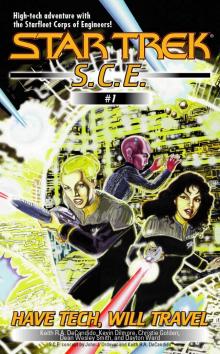 Have Tech, Will Travel
Have Tech, Will Travel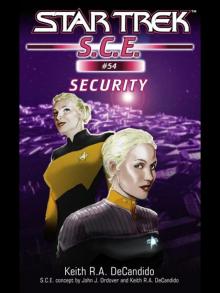 Security
Security